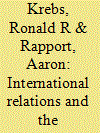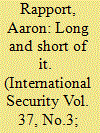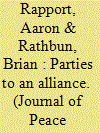|
|
|
Sort Order |
|
|
|
Items / Page
|
|
|
|
|
|
|
| Srl | Item |
| 1 |
ID:
141970


|
|
|
|
|
| Summary/Abstract |
The idea of “least likely” (or “hard”) and “most likely” cases with which to test theories has been addressed in many prominent works on qualitative methodology. Such research designs are especially common among those working in the field of security studies. Nevertheless, there exists considerable confusion regarding how these cases should be defined and how authors can draw sound inferences from them. At worst, such confusion leads to the impression that researchers apply the labels of least and most likely cases in an arbitrary fashion. This article advances two related rationales for categorizing cases as least or most likely, describing the necessary steps researchers should follow to employ them correctly. It incorporates literature from security studies to demonstrate the pitfalls that researchers may be vulnerable to without a precise idea of how least and most likely cases should be used.
|
|
|
|
|
|
|
|
|
|
|
|
|
|
|
|
| 2 |
ID:
118159


|
|
|
|
|
| Publication |
2012.
|
| Summary/Abstract |
Theories of international relations have often incorporated assumptions about time horizons-a metaphor for how heavily actors value the future relative to the present. However, they have not built on a growing body of experimental research that studies how human beings actually make intertemporal tradeoffs. In this article, we present relevant findings from psychology and behavioral economics, notably those of "construal level theory" (CLT), and explore these findings' implications for three classic questions-international cooperation, preventive war, and coercion. We argue that experimental evidence regarding how people discount future value and construe future events challenges the conventional wisdom on international cooperation. We further maintain that CLT helps explain a longstanding puzzle about preventive wars-namely why they are often initiated too late by declining powers but too soon by rising competitors. Finally, we rely on these findings to explain who wins coercive contests and why compellence is often, but not always, harder than deterrence. Scholars of international relations often embed in their theories crucial assumptions about time horizons, and this article seeks to show what differences it makes if we ground these assumptions in what we know about actual human decision making.
|
|
|
|
|
|
|
|
|
|
|
|
|
|
|
|
| 3 |
ID:
117449


|
|
|
|
|
| Publication |
2012.
|
| Summary/Abstract |
The George W. Bush administration's assessments of challenges that might come after the fall of Saddam Hussein's regime in Iraq were wide of the mark, but it is unclear why this was the case. Along with the difficulty of anticipating the future, perhaps the opportunity costs of allocating resources to postconflict considerations were simply too high. Institutional biases and civil-military friction may have also led actors to privilege certain information and plans over others. Although plausible, these hypotheses do not sufficiently explain strategic assessment prior to the 2003 invasion. They cannot account for the substance of most senior policymakers' assessments, especially those of President Bush and Defense Secretary Donald Rumsfeld, which was optimistic when late-stage operations were considered but not when combat plans were deliberated. An established psychological theory that describes how people mentally represent distant future actions-as opposed to those that are seen as impending-explains the nature of strategic assessment in the Iraq case. As individuals think about actions at the end of a sequence of events, the desirability of their goals becomes increasingly salient relative to the feasibility of achieving them. This makes decisionmakers more prone to underestimate the costs and risks of future actions.
|
|
|
|
|
|
|
|
|
|
|
|
|
|
|
|
| 4 |
ID:
178685


|
|
|
|
|
| Summary/Abstract |
While much research has been done on the domestic determinants of alliance institutionalization, there has been a neglect of the effect of domestic politics, by which we mean contestation between political actors in the same country. We hypothesize that the ideology of the parties governing countries negotiating the terms of security relationships will affect their preferences over the degree and kind of institutionalization seen in alliances. Drawing on previous literature, we argue that rightist parties are more sensitive to sovereignty costs and will therefore insist on maintaining more control over policy than their leftist counterparts. They can assert control either by imposing hierarchical forms of institutionalization when they are a stronger party to an alliance or by avoiding institutionalization altogether if they are the weaker party in an alliance. In contrast, we expect leftist parties to be less sensitive to sovereignty costs and generally favorable to more voice-driven, egalitarian institutions that have institutionalized mechanisms for consensus-building, regardless of their country’s relative power position. Combining the ATOP dataset on alliance design with the Parties Manifesto Project, we find broad support for our hypotheses. Our findings indicate that scholars should pay more attention to the internal ideological contestation within countries, making room for domestic political factors that go beyond regime type.
|
|
|
|
|
|
|
|
|
|
|
|
|
|
|
|
| 5 |
ID:
171983


|
|
|
|
|
| Summary/Abstract |
What factors influence whether allies have the same understandings of threats and adversaries? Allies may infer they share each other's views without verifying if this is so, with harmful consequences. A set of psychological biases can cause policymakers to neglect valuable information held by one or more allies, and instead disproportionately discuss information that every allied contributor to a threat assessment already knows. Psychologists call the unshared assessments “hidden profiles”: an evaluative profile that postulates key features of a problem or threat, hidden in the sense that it is unintentionally withheld from the wider group. This manuscript compares the hidden-profiles model and alternative theories of threat perception using the 1956 Suez Crisis as a case study
|
|
|
|
|
|
|
|
|
|
|
|
|
|
|
|
| 6 |
ID:
082839


|
|
|
|
|
| Publication |
2008.
|
| Summary/Abstract |
Is neoconservatism a coherent theory of international politics? Many previous efforts to illuminate what might be called the neoconservative worldview have been limited to descriptions of policies favored by neoconservatives, while illumination of an underlying ontology is largely absent. This article proceeds by drawing a series of premises about the social world from authors who identify with neoconservative political thought. Despite similarities with liberalism and realism, the core assumptions of neocon theory collectively represent a systemic constructivist account of IR. Neoconservatives put forth a set of propositions which lead to generalizable conclusions regarding the outcomes of state interactions in the international system
|
|
|
|
|
|
|
|
|
|
|
|
|
|
|
|
|
|
|
|
|